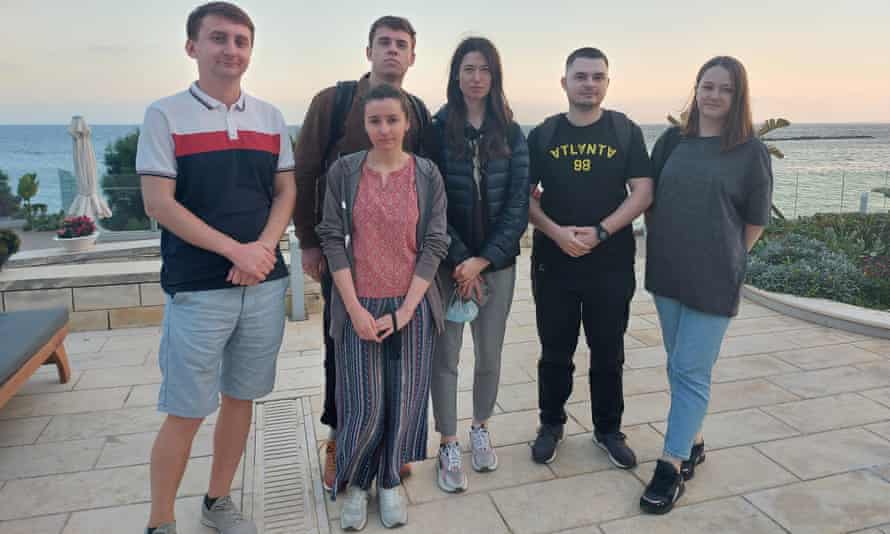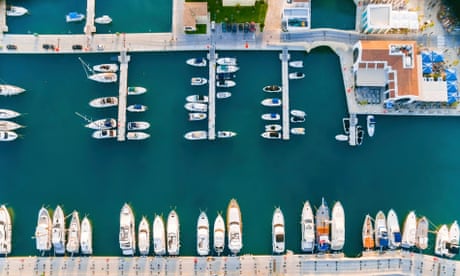The Guardian 23 March 2022
Xenia Karpenko (left) and her Ukrainian co-workers in Limassol in front of a shop with Cyrillic signage. Photograph: Helena Smith/The Guardian
Flown out on one of the last flights to leave Kyiv before Russia invaded, the Ukrainians take in the scene. To their left lies the Mediterranean, to their right a palm tree-fringed five-star hotel.
“We all work for a multinational IT firm which has an office in Cyprus,” says Xenia Karpenko, who since late February has been in the seaside resort of Limassol. “Less than 48 hours before the Russian invasion it said: ‘We’ll fly you out, with your family, your partners, your pets.’ There were 200 of us onboard. Now we have no idea what tomorrow will bring.”
It may seem an unusual place for them to be.
Until Cyprus began clearing up its act, it was better known as a refuge for high net worth Russians, many hiding ill-gotten gains. At least five Russian oligarchs with links to the eastern Mediterranean island are on EU sanctions lists.
And no Cypriot city has lured Russians more zealously than Limassol. With its 40,000-strong Russian community, Russian banks, Russian media outlets and privately run Russian schools, it is easy to see why the waterfront metropolis is also known as Limassolgrad.

On boulevards lined with billboards emblazoned with Cyrillic script, it is Russian that is frequently heard. Russians account for the vast majority who have also invested in multimillion-euro homes – often in high-rise apartment blocks changing the city’s skyline – to attain citizenship under a now scrapped cash-for-passports scheme reputed to have raised more than €9bn (£7.6bn) for the island. It also has its own Russian political party.
“We love it here,” says Valentina Ivanova, who was out strolling with her sausage dog. “It’s hard to miss Moscow in the sun but to be honest we understand our president. The west pushed Russia too hard. Putin didn’t have a choice with Ukraine; he had to go in.”
Although Cyprus has a growing Ukrainian community (estimated at about 4,000), it is not lost on those now forced to flee that they have ended up in one of Europe’s most pro-Russian milieus. Almost alone among EU capitals, Nicosia has borne witness to both protests in support of Vladimir Putin’s “special military operation” as well as fiery anti-war rallies. Tensions have erupted between Ukrainian and Russian youngsters in schools and university lecture halls.
But the bloc’s most easterly member is keen to emphasise it has thrown its weight behind the west. The tiny state has taken in more than 3,000 displaced Ukrainians to date. Last week it delivered what was described as its biggest-ever humanitarian aid package to the war-torn nation. To punish Moscow for its military actions, the non-Nato member has also banned Russian naval ships from mooring in Cypriot ports to refuel and restock, the island’s foreign minister told the Guardian.
“There is a war going on. We are not going to be seen to be aiding and abetting it,” said Ioannis Kasoulidis, noting that Cyprus, like fellow-Orthodox Greece and the rest of the EU, has been placed by Russia on an “unfriendly countries” list. “We used to be exposed to money laundering but now we’re good boys. The shell companies, the ‘golden passport’ stories are over. All possible loopholes have been closed … and we’re doing everything we can not to allow anyone to say we’re not observing EU sanctions.”
Despite initial reluctance, Nicosia also agreed to exclude Russian banks from accessing the Swift international payment system. The move is seen as particularly significant because of the island’s role as one of Russia’s biggest foreign investors, the result of Russian-owned offshore companies reinvesting in the country. Ukraine’s foreign minister, Dmytro Kuleba, was quick to hail the decision a diplomatic victory.
For Ruslan Nimchynskyi, Kyiv’s ambassador to Cyprus, there is no doubt whose side Nicosia is on. Although sleep-deprived and exhausted – “diplomacy like the army are working 24/7” – the envoy is animated by what he sees as an outpouring of solidarity towards Ukraine. In addition to official expressions of support, there are smaller gestures, such as the flowers that are placed almost daily outside the villa that houses the embassy, alongside placards denouncing Russian aggression.
“We are deeply grateful to the government of Cyprus for the support and unity it has shown,” he says. “I see that ordinary Cypriots feel our pain.”
President Nicos Anastasiades has said his compatriots’ experience of war, division and ongoing Turkish occupation underpins local compassion towards Ukraine.
But EU diplomats and analysts say official condemnation of Russia’s move towards war was slow at first. “Russia was not mentioned by name because they didn’t want to offend a power perceived to be pro-Greek Cypriot in the UN security council even if, in reality, Moscow has no interest in a solution of the Cyprus problem since keeping the island divided and out of Nato suits it just fine,” says Hubert Faustmann, professor of history and political science at the University of Nicosia.
It was only when, days before the invasion, Putin recognised the self-proclaimed Donetsk and Luhansk “people’s republics” as independent states that alarm bells sounded in government circles. “It was too close to the situation here,” Faustmann says, referring to the breakaway Turkish republic of northern Cyprus that unilaterally declared independence in 1983, nine years after Ankara sent in troops prompted by a coup aimed at uniting the island with Greece.
For a country so dependent on tourism, Cyprus will pay a heavy price for its support of sanctions.
The island’s GDP is projected to contract by 2%, largely because of the closure of Cypriot airspace to Russia, the island’s second largest tourist market after the UK. “Tourism accounts for 20% of our GDP and it has become increasingly dependent on Russians,” says Philokypros Roussounides, the Cyprus Hotel Association’s director general. “Before Ukraine, we were talking of a 10%-to-15% increase in Russians and Ukrainians who together make up around 22% of our entire tourism pie. The impact is definitely going to be big.”
Stanislav Osadchiy, Moscow’s longtime ambassador to Cyprus, has already said that Nicosia has “shot itself in the foot” by backing measures “aimed at demonising” his country. After predicting Russian tourists would instead head to Turkey, which has not endorsed the flight ban, he made clear that Moscow was watching Cyprus closely.
“Everything will be taken into account [including] those measures that Nicosia will take in relation to our country,” he told Phileleftheros, a Cypriot daily. “For our part, we will try to maintain those good relations which were previously formed. We hope that Nicosia will respond in a similar way.”
Kasoulidis is sanguine. “All EU member states have some impact from the sanctions. They were unavoidable and we all agreed in unanimity about them,” he says, insisting that while Nicosia has reserved the right to lift the ban on Russian flights, if Turkey fails to follow suit, he does not think it would.
“We are working to bring tourists in from other areas. It is anyway better to diversify our sources.”

